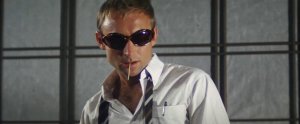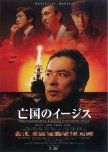
Barely a lawsuit away from that of Steven Seagal's Under Siege
Aegis is much more in the mould of Hollywood productions than of your typical Japanese action thriller. Gently paced, carefully plotted and thematically complex, the film raises plenty of points for discussion amidst the myriad of generally uneven political undercurrents about Japan's role in the current world but manages to overcome its rather simplistic outline with a degree of class filmmaking. Director Junji Sakamoto (whom I didn't have the best of introductions with) takes his time building suspense and laying out the state of play before kicking everything into gear. In conjunction with wonderful photography and the red hues of the ship's interior comes always reliable Hiroyuki Sanada turning in a fine performance as the reluctant everyman forced to save the day. While a little too long for what it is, Aegis makes for some enjoyable entertainment harking back to the US' golden years of action.Cet avis était-il utile?
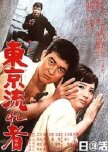
Tetsuya Watari is just Lupin III in this
and I'm okay with that.Weird, wild, and nearly incomprehensible, Seijun Suzuki's Tokyo Drifter directly responds to his mounting boredom and dissatisfaction with the common yakuza thriller, reimagining it as an excessive pop-art James Bond cartoon. Absurdly funny yet strangely surreal, the studio-imposed limitations on Suzuki never become a hindrance, radiating with excessive coolness and often filled with flights of outrageous excesses and ballistic action. An anything-goes, in-your-face rampage of narrative disorientation and inspired lunacy, Tokyo Drifter incredibly sends up its own genre identity with a degree of flagrant and rapturous craftiness in a total gunbutt attitude to everything conventional.
Cet avis était-il utile?
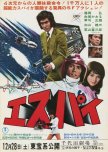
An obscure slice of brilliance
I've said it before, and I'll say it again, this is hands down Jun Fukuda's best movie. ESPY knows its premise is utterly bonkers and just runs with it; part 007, part B-grade exploitation and with a dash of Scanners, it's all exceptional fun. It's a film that fits right at home with old ITC shows like The Protectors due to its gorgeous globe-trotting gentlemen spy aesthetic but with that classic 70s tokusatsu twist. Fantastic direction, incredible music, deliciously camp with just the right amount of head explosions and teleporting nonsense to keep anyone entertained. While I may not love his Godzilla flicks, by god I will champion ESPY as Fukuda's finest till the day I die.Cet avis était-il utile?

Don't watch it dubbed
A movie crying out to be seen in its original language (and widescreen), Carry on Wise Guy is a relatively straightforward and sometimes painfully unfunny martial arts adventure featuring Gordon Liu, one where whenever he's not onscreen becomes borderline intolerable. Even in the cropped and super crummy VHS-level transfer this movie has, you can tell that the choreography of the fight scenes goes hard, the major saving grace of this otherwise relatively low-budget comedy. Unfortunately, the plot is super generic, where things happen with no rhyme or reason. One minute it is a jiāngshī horror comedy scored with Walter Murphy's A Fifth of Beethoven, the next minute it's a serious foot-flying adventure to deliver a map of Japanese movements to Chinese troops. Sadly, the disingenuous dub isn't doing this movie any favours, (I swear one of the voice actors was Eric Idle of all people, sounding like he does in Casper 😭) and as it stands, Carry on Wise Guy is worth a fleeting look mainly for Liu kicking arse.Cet avis était-il utile?

The Anno influence
Chronicling the bloodiest and most pointless last stand of the Pacific Theatre, The Battle of Okinawa is far more well-known nowadays for essentially giving Hideaki Anno his career. Told in a quasi-documentary-like format, with black and white newsreel footage juxtaposed with narration from Kiyoshi Kobayashi over the dramatic scenes, Kihachi Okamoto manages to expertly balance horrific authenticity with few artistic liberties taken along the way. It's a film that captures an essence of bravery, lunacy and hollow childlike subservience, as well as the sheer devastating horror that gets increasingly desperate and progressively violent the longer it goes on, the final 5-minutes alone comparable to the likes of Saving Private Ryan in its entirety; Okamoto pulls no punches in the graphic details with his cynical, dark sense of humour coming out in full force. With incredible performance from its cast, most notably Tetsurō Tanba and Tatsuya Nakadai, a fantastic if limited score by Masaru Satō and energetic direction, The Battle of Okinawa is an incredible epic, one of exhaustive and continual bombardment that takes no prisoners leaving the camera smeared with blood by its dramatic end.Cet avis était-il utile?

Icy beauty
Underneath all its gorgeously cold and snowy landscapes lies a film designed to make you feel warm inside even with the uncomfortably cruel realities and melancholic tone it proudly parades. Despite being so innocently titled, Station from the get-go doesn't just tug at your heartstrings, it grasps them firmly in its hands and refuses to let go until you've wept multiple times. Director Yasuo Furuhata utilises Daisaku Kimura's photography with such wickedness, piercing deep into your psyche through a cosy sense of atmosphere; combing a quiet, emotional drama with a gritty and exciting detective thriller, all the while Ryudo Uzaki's stunning musical score mesmerises and dances gently throughout the film's runtime. It's with Station we find the insurmountable Ken Takakura once again on top form, a man of unchallengeable masculinity who still manages to project great sensitivity beneath his stoic outer surface. As professional and fatalistic as it is subtle and cryptic, Station lights up the screen with a glow comparable to that of a warm log fire.Cet avis était-il utile?
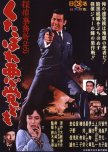
Detective Bureau 2-3: Go to Hell Bastards
0 personnes ont trouvé cette critique utile
Baller title
I swear there must be a rule that, when making a crime film for Nikkatsu, one's title must go hard as fuck, cause you're goddamn right I watched this purely for the title alone. An ultra-stylish, rapid-fire yakuza thriller, Detective Bureau 2-3: Go to Hell, Bastards! plays almost like an anarchic parody of the genre, from its eye-popping colours, wild comedy and even a bloody musical number. Suzuki's send-up of post-war greed has got to be one of his loosest and goofiest, directing it all with the tongue-in-cheek attitude that, while certainly has lost its bite today, makes for a rip-roaring good time. An unholy cocktail of Adam West's Batman, Connery's 007, Warhol's pop art and swinging jazz.Cet avis était-il utile?
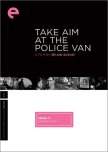
Take Aim at the Police Van
0 personnes ont trouvé cette critique utile
Take Aim at the Convoluted Plot
An exceptionally well-shot if bitterly average and utterly bewildering mystery, Take Aim at the Police Van marks the very early days for Seijun Suzuki, far less abstract than what I've heard about his more well-known works. He's shooting to a formula but delivering where it matters, be it the woman killed by an arrow to the boob or the faceless gunman who lovingly strokes his rifle's stock before sticking his bubblegum atop its scope. It's a film I wish was slightly more cohesive (and less jazzy) than it is but Police Van benefits from the endless swagger of its lead and fun filmmaking flourishes to stop it from being a frustrating or bad time. A testament to how artists pumping out quickie exploitation movies can often work in truths about their times that prestige filmmakers can't.Cet avis était-il utile?
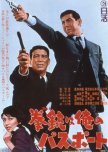
A Colt Is My Passport
0 personnes ont trouvé cette critique utile
Raw title m8
A Japanese New Wave Spaghetti Western-styled noir thriller and one of the rawest fucking titles ever, A Colt is My Passport is a down-and-dirty but gorgeously photographed yakuza film, brimming with formal experimentation. The winning combination of Takashi Nomura's supreme emulation of the American noir formula with the sheer badassery of Jō Shishido trumps the often slow middle portion of the film. The climax alone, especially the final 15 minutes and masterful ending, more than makes up for the cluelessness of the majority of the storyline; ending not too dissimilarly to that of Sergio Leone's masterpieces. Rounding off the film with a musical score that sounds almost identical to that of Morricone's works, A Colt is My Passport is a lean, mean and efficiently entertaining piece of trans-cultural fusion where one's passport gives you a fast ride straight to hell. First Class.Cet avis était-il utile?

Proto-Shin
If you enjoyed the boardroom meetings of Shin Godzilla, then Day of the Kaiju will serve as a perfect little companion piece to that film, a very bold and lower-budgeted precursor. It tackles very similar themes to that of Shin Godzilla, offering both a serious look at the political hurdles that would be involved with dealing with giant lifeforms and sharp allegorical rebukes toward the Japanese government's handling of the Fukushima Nuclear Disaster. One only needs to look at Kazuhiro Nakagawa's directing credentials and the film's wonderful direction starts to make sense. The acting is all solid and the minimal VFX is handled very well given the minuscule budget, accompanied by a very understated and wonderful piano score by Masaaki Sasaki, it's just a well-done short that I have next to no criticisms of, exceptionally solid if too short. All in all, Day of the Kaiju comes down to being a foundation piece for a much more expanded take on its premise, I could easily have seen this being expanded out into a TV show. If nothing else, it does highlight my waning love towards Shin Godzilla.Cet avis était-il utile?

You can't try to see something that's invisible.
The second of three Japanese-made Invisible Man films, this time by Toho studios and much more overt in terms of leaning into post-war trauma than Daiei's The Invisible Man Appears. Unlike that film, Toho's production puts the trauma of its characters front and centre with the whole invisibility angle not actually turning up until about halfway through.In Ginza, the dead body of an invisible man is discovered, alongside a suicide note. The note reveals that there is at least one other invisible man still alive. An ex-army commander reveals that during the war, Dr Nishizaki discovered by chance a particle that, when properly utilized, turns any object invisible. At the end of the Pacific War, a special attack corps made up of invisible men crashed on Saipan Island and were presumed dead, however, two survived. The effects of the invisibility particle cannot be undone.
Another very loose adaptation of the original story, this Invisible Man is far less a deranged killer than some adaptations have made him out to be and is much more focused on a sympathetic portrayal of its titular character. The Invisible Man of this film is much more focused on dismantling an organised crime syndicate that dresses up as the iconic image of the said character in order to commit crimes.
This is the only other film I've seen from Motoyoshi Oda outside of the two edits of Godzilla Raids Again. It's certainly a very moody film and like Raids Again, Oda's direction is solid and made a lot better here thanks to some pretty great editing. There are some great set pieces and a very consistent tone throughout the film and of course, there's Oda's patented car chase by the end. The special effects sequences from Eiji Tsuburaya are very clever but sparingly used, so there's a lot of pressure from the actors to be extremely good at miming which they thankfully fully commit to.
The plot is admittedly very messy in places and can even be almost incomprehensible at times, where this film does triumph however is in its characters. Seizaburo Kawazu as Takamitsu Nanjo, the film's Invisible Man is a tragic character, who was turned invisible against his will in order to help provide the funds to give his mother care, he finds new motivation in order to help a little blind girl finally regain her sight. Like with Godzilla Raids Again, it's wonderful to see Yoshio Tsuchiya in something other than a villainous role, here as Komatsu he assists in uncovering the major connections that link the criminal gangs together as an active driving force behind the plot. The rest of the cast is all pretty good.
Overall, Toho's adaptation of The Invisible Man is another solid little affair, once again less focused on the horror of the original and more focused on the science-fiction aspects of the production. You can see the later influence of their transforming human series starting their development here.
Cet avis était-il utile?
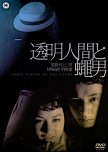
Toumei Ningen to Hae Otoko
0 personnes ont trouvé cette critique utile
Invisibility is no longer in the realm of impossibility.
The third and final Invisible Man film created by the Japanese, The Invisible Man vs. The Human Fly acts as a standalone sequel of sorts to Daiei's The Invisible Man Appears but you wouldn't know that from watching the film since it doesn't even acknowledge the film that came before.A series of ghastly murders are being committed. The one similarity in each of the murders is that a weird buzzing sound is always heard right before the murder occurs. Is the killer invisible or possibly some other incredible creature?
Like many of the B-movie tokusatsu adventures that would follow, The Invisible Man vs. The Human Fly brings the wartime trauma to the fore, implying that this bodily corruption is an extension of the spiritual corruption suffered by those who lived through the conflict.
The Invisible Man Appears had opted to minimise the threat of violence to emphasise the immoral criminality of casual gangsterdom, thuggish armed robbery and the obscenity of fighting over a shiny diamond necklace when so many were going hungry, but Human Fly opens with a murder which turns out to be one of six recent mysterious cases of unexplained violent death. The only clue the police can come up with is a matchbook, later realising that some of the victims had served during the war together.
Where the Invisible Man in Daiei's first film is used as a warning about the misuse of science and the rising inequalities of the complicated post-war economy. By the 1950s, he'd become a more sympathetic figure. For Daiei, he was now a force of order, an unambiguously good instrument of law enforcement and a guardian of justice. For Toho, he was the melancholy ghost of the middle-aged man who'd been transformed by militarist folly, and like the 1949 Invisible Man knew he could never change back. The Human Fly, meanwhile, was everything that was rotten in the current society - embittered, greedy and vengeful, an example of bad science for which there was no legitimate application.
The impressive effects work of Eiji Tsuburaya has been abandoned and while Tōru Matoba attempts to do the ideas created by Eiji justice, his creativity is extremely limited by his choices of shots. Although the sequence of the railway and train exploding is a bright spot in an otherwise underwhelming effort. There's very little screentime dedicated to the titular characters and they are mostly relegated to background roles while a substandard police procedural plays out in the foreground.
Mitsuo Murayama's direction is fine, the story is fine, the characters are fine, it's just all a big bag of fine. It's not a film that is by any means special like the last two, just insanely forgettable. The actors don't really commit to the insane plot and ideas the film wants to portray and it mostly comes across as half-arsed in places.
Overall, The Invisible Man vs. The Human Fly is an entertaining if forgettable romp in the world of tokusatsu, you can do so much better but equally, you could do so much worse.
Cet avis était-il utile?
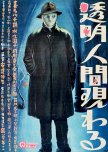
Tomei Ningen Arawaru
0 personnes ont trouvé cette critique utile
There is no good or evil in science, but it can be used for good or evil purposes.
The Invisible Man Appears holds the unique distinction of being the earliest surviving tokusatsu production and one of three Japanese-made films starring the titular character. It's a relatively unique and unusual production compared to the later tokusatsu films of the 50s and 60s where it remains entirely forward-looking, relegating the trauma of World War II to background context rather than primary motivation.Jewel thieves become interested in an invisibility formula invented by Professor Nakazato and want to use his invention to acquire a diamond necklace called the "Tears of Amour"...
Clearly taking influence from the exposure to American films during the Allied Occupation of Japan, The Invisible Man Appears is a very loose adaptation of the original Wells novel and appears to take cues from the more recent Universal movies being produced during the then more recent years of the 30s and 40s.
Less focused on murderous intent and instead, leaning into a far more wacky crime spree after a MacGuffin that symbolises post-war greed and selfishness. Astutely pro-science but wary of its misuse, the film develops a preoccupation with the role and responsibility of the scientific community as guardians of future safety.
I take my hat off to Arrow Video once again for managing to liberate these two Daiei classics from their vaults and finally giving them the attention they deserve outside of Japan. Unfortunately, the original film masters for this and its follow-up have long since vanished, a testament to their age, and what we are left with is a film cobbled together from surviving 16mm exhibition prints. There are all the artefacts to be expected with old celluloid; hairs, scratches, and authentic film jitter, but for anyone purchasing these old movies that should be expected and are unobtrusive.
Writer and director, Nobuo Adachi, delivers a fundamentally threadbare affair, the characters themselves are laughable in places. Seriously, these criminals have an Invisible Man at their disposable and all they can think to use him for is stealing a necklace, which they ultimately fail at numerous times. But it doesn't matter too much in the long run given that it nails the basics of being an entertaining cops and robbers film interspaced with a multitude of science fiction elements and a multitude of red herrings along the way.
His direction however is pretty good, there's a heavy noir atmosphere as actors deliver lines with slashes of light across their eyes, while simple actions such as the Invisible Man smashing glasses and pots on the floor are caught with whipping camera movements and canted angles. Clichés of the age, sure, but the darker ambience adds a much appreciated dramatic flair to accentuate the emotional beats.
This film also marks a very early credit for special effects wizard, Eiji Tsuburaya and while very rough in their execution, probably not helped by the so-so picture quality of the film prints, they showcase his talents right from the get-go making it no wonder that he would go on to be such a success in his field. He recreates many of the iconic moments that we've seen done to death in popular culture and yet with its film noir style they take on a very different feel and meaning.
Overall, The Invisible Man Appears is a solid interpretation of the character in an entirely new setting, some good acting, memorable direction and some very 'of the time' music help cement this film as the very definition of a hidden gem.
Cet avis était-il utile?
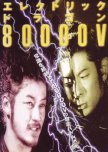
Electric Dragon 80.000 V
0 personnes ont trouvé cette critique utile
Nowhere near as cool as it should be
A 55-minute hyperkinetic descent into electro-charged madness, Electric Dragon 80.000 V is a virtually plotless, overly-extended music video playing like a punk rock shock to the brain. Championing kinetic anarchy and raw aggression, the film's underground visual style with its high contrast black and white cinematography and bizarre imagery set to an overwhelming eardrum-shattering industrial noise soundtrack will certainly have its fans. I can't deny that the film is a wildly unique piece of eye candy, often with fast-cutting sequences filled with flashes of electricity and surging power within our characters, not to mention the wild guitar-playing sequences. Having that high contrast crisp monochrome look, Electric Dragon plays like a manga come to its fullest realisation, a visual and aural marvel, shot and edited with boundless energy and style, and yet I'm still left wanting more.Cet avis était-il utile?

Mifune could direct, who knew?
Legacy of the 500,000 sees legendary actor Toshirō Mifune both in front and behind the camera for the first and only time in his career, taking elements from Joseph Conrad's Heart of Darkness and crafting a fun little treasure-hunting adventure with darker undertones. Mifune's level of technical prowess is genuinely remarkable and something he seems very passionate about, with plenty of impressive shots and making great use of being shot on location in the Philippines, it feels less like a big studio film and more like an independent B-movie. The performances from the entire cast are all solid, Mifune is the star so obviously gets the most screen time but it's time he happily shares alongside his co-stars. While the photography by Takao Saitō was genuinely lovely for the entire runtime, utilising the B&W Tohoscope format to great effect, choosing to transition between scenes with Flash Gordon / Star Wars-esque wipes was certainly a choice. Nipping along at a fast pace, Legacy of the 500,000 is a genuinely great and highly enjoyable little film, more than showing what Mifune was capable of had he chosen to spend just as much time behind the camera as he did in front of it and for that reason alone it's worth a watch.Cet avis était-il utile?

